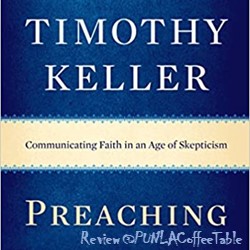23V24 – Reasonable Faith: Christian Truth and Apologetics (Book Review)
(written by Dr. Kip Wehrman 07/28/2023)
Hello my friends. Thanks for joining me today for an @ the PUNLA coffee table. I would like to share with you a book I read by William Lane Craig “Reasonable Faith: Christian Truth and Apologetics”. I to share this with you as a potential resource that at least some of you might be interested in.
Let’s Pray.
Introduction
Reasonable Faith: Christian Truth and Apologetics by William Lane Craig begins with “What is apologetics? Apologetics (from the Greek apologia: a defense) is that branch of Christian theology which seeks to provide a rational justification for the truth claims of the Christian faith.” Craig asks what good is apologetics? Apologetics has a role in shaping culture, strengthening believers, and evangelizing unbelievers. The field of apologetics is broadly divided into two types; offensive and defensive. Offensive apologetics seeks to present a positive case for Christian truth claims. Defensive apologetics seeks to nullify objections to those claims.
Part 1 : De Fide
Chapter 1 : How Do I Know Christianity Is True?
Chapter 1 addresses how do I know Christianity is true? Craig begins with historical background from medieval (Augustine and Thomas Aquinas), the enlightenment (John Locke and Henry Dodwell), contemporary (Karl Barth and Rudolf Bultmann and Wolfhart Pannenberg). Craig then discusses Alvin Plantinga attack on theological rationalism.
Craig distinguishes between knowing Christianity to be true and showing Christianity to be true. Craig examines the role of the holy spirit and role of argument and evidence in knowing Christianity to be true. Fundamentally, the way we know Christianity to be true is by the self-authenticating witness of God’s Holy Spirit. The believer is indwelt by the Holy Spirit and the Spirit bears witness to the believer. The Scripture also tells us that Holy Spirit has a role geared specifically to the needs of the unbeliever. Therefore, the only role left for argument and evidence to play is a subsidiary role. There is a danger in all this that some people might say that we should never seek to defend the faith.
What are the roles of the Holy Spirit and of argument in showing Christianity to be true. The role of reason is basically how to prove to another person that our faith is true. One way is to use deductive arguments like; 1) if God exists, objective moral values exist. 2) objective moral values exist. 3) therefore, God exists. Another is if Jesus were not Lord, He would be a liar or a lunatic. 2) Jesus was neither a liar nor a lunatic. 3) therefore, Jesus is Lord. Another way is inductive arguments like; 1) groups A, B, and C were composed of similar people suffering from the same disease. 2) group A was administered a certain new drug, group B was administered a placebo, and group C was not given any treatment. 3) the rate of death from the disease was subsequently lower in group A by 75 percent in comparison with both groups B and C. 4) therefore, the new drug is effective in reducing the death rate from said disease.
The Christian apologist may employ both deductive and inductive arguments in defense of Christian theism. In order for the arguments to be good ones, the premises need to have a particular epistemic status for us. The role of the Holy Spirit is to use our arguments to convince the unbeliever of the truth of Christianity.
Part 2 : De Homine
Chapter 2 : The Absurdity of Life without God
Chapter 2 addresses the absurdity of life without God. Craig begins his discussion with some historical background from Blaise Pascal, Fyodor Dostoyevsky, Søren Kierkegaard, and Francis Schaeffer. For if there is no God, then man’s life becomes absurd. If there is no God, then man and the universe are doomed. Like prisoners condemned to death, we await our unavoidable execution. There is no ultimate meaning without God and immortality. There is no ultimate value without god and immortality. There is no ultimate purpose without god and immortality. Craig shifts to the practical impossibility of atheism. Without God, life has no meaning. But man cannot live consistently and happily knowing that life is meaningless. Craig then addresses the value of life problem. A universe without moral accountability and devoid of value is unimaginably terrible which is why Atheist live as though there is. Craig then addresses the purpose of life problem. Craig says, “Since there is no objective purpose in life, the only answer can be, to contend for one’s own made-up purposes—hence, the irresistible tendency to treat career advancement and fame as though they really were objectively important ends, when in fact they are nothing.” The human predicament in the atheistic worldview is insufficient to maintain a happy and consistent life. In contrast, there is the success of biblical Christianity. which answers the questions and gives meaning and purpose to our lives.
Part 3 : De Deo
Chapter 3 : The Existence of God (1)
Chapter 4 addresses the existence of God as the solution for the human predicament. The ontological argument attempts to prove from the very concept of God that God exists: if God is conceivable, then he must actually exist. In contrast to the ontological argument, the cosmological argument assumes that something exists and argues from the existence of that thing to the existence of a First Cause or a Sufficient Reason of the cosmos. Craig looks at cosmological arguments of Al-Ghzali, Thomas Aquinas and G. W. F. Leibniz. Craig looks at the teleological arguments of Plato and Aristotle, Thomas Aquinas, and William Paley. The moral argument for the existence of God implies the existence of a Being that is the embodiment of the ultimate Good, which is the source of the objective moral values we experience in the world. Craig looks at the arguments of Thomas Aquinas and William Sorley. Craig discusses both the Leibnizian cosmological argument and the Principle of Sufficient Reason. Craig then discusses the various “how the universe began to exist” models; the standard model, the steady state model, oscillating models, vacuum fluctuation models, chaotic inflationary model, quantum gravity models, and string scenarios.
Chapter 4 : The Existence of God (2)
Chapter 4 continues the discussion of the existence of God. Craig discusses the recent resurgence of the teleological argument with neo-Darwinism and cosmic fine-tuning. The concept of cosmic fine-tuning, which cannot be determined from the physical laws themselves. In a sense it is easier to discern than to articulate that this fine-tuning of the universe seems to require a designing intelligence. Craig discusses three alternative accounts of fine-tuning; physical necessity, chance, and the design hypothesis.
The moral argument, like the cosmological argument, is part of a family of diverse arguments for the existence of God, but in the moral argument comes from moral considerations. “1) If God does not exist, objective moral values and duties do not exist. 2) Objective moral values and duties do exist. 3) Therefore, God exists.” The moral argument asserts that there are objective moral values and duties. Craig goes on to discuss the Euthyphro dilemma from Plato and the ontological argument.
Part 4 : De Creatione
Chapter 5 : The Problem of Historical Knowledge
Chapter 5 addresses the problem of historical knowledge. George Ladd writes, “The uniqueness and the scandal of the Christian religion rest in the mediation of revelation through historical events.” Craig then discusses the historical background of this issue through the medieval period. Craig then discusses how apologetics has changed in the modern period with the rise of historical consciousness which has paralleled historiography. The nineteenth and twentieth centuries have seen the rise of historicism, relativism, and postmodernism. The historical method or the historical-critical method continues to be a primary source for biblical exegesis. There are many objections to the objectivity of history. These include the problem of lack of direct access, and the problem of lack of neutrality. Craig then concludes this chapter with a critique of historical relativism.
Chapter 6 : The Problem of Miracles
In chapter 6 Craig begins with, “Undoubtedly, one of the major stumbling blocks to becoming a Christian for many people today is that Christianity is a religion of miracles.” Craig then discusses the historical background including the deist objections to miracles. The concept of miracles conflicts with the Newtonian world-machine view of many. Miracles violate the unchangeable order of the nature. Some like Benedict Despinoza have argued that miracles are insufficient to prove God’s existence. David Hume’s “in principle” argument challenges that we could identify a miracle. Hume believed that evidence for miracles does not amount to full proof. Spinoza was countered by Jean Le Clerc, Samuel Clarke, and others, pointing out that the empirical evidence for miracles is greater than that supporting Spinoza and that many scientific principles are not defendable by the Spinoza’s standard. Hume was countered by Thomas Sherlock, Gottfried Less, and others. Sherlock argued the evidence was stronger than the evidence against. Less argued that the supernatural is by its definition outside of nature and therefore not governed by the Newtonian world-machine.
Part 5 : De Christo
Chapter 7 : The Self-Understanding of Jesus
In Chapter 7 Craig begins, “Christianity is belief in a person, a genuine historical individual—but at the same time a special individual, whom the church regards as not only human, but divine.” The life of Jesus movement during the late eighteenth and nineteenth centuries strove to find the historical Jesus behind the figure portrayed in the Gospels. In dialectical and existential theology, the Jesus of history faded into obscurity behind the Christ of faith. This resulted in a new quest for the historical Jesus. The primary object of the quest of the historical Jesus is Jesus himself, not some abstraction manufactured by the historian. Craig addresses the denial of Christ’s divine claims by Robert Fund in 1985 with the Gospels accounts themselves. Craigs continues with a discussion of both the Christological titles such as messiah, Son of God, and Son of Man which point to who Jesus is.
Chapter 8 : The Resurrection of Jesus
Chapter 8 addresses the resurrection of Jesus. Craig begins with the case for the resurrection in the traditional apologetic which is summarized in three steps: the gospels are authentic, the text of the gospels is pure, and the gospels are reliable. The apostles were neither deceivers nor deceived, they sincerely believed Jesus was resurrected. The origin of Christianity all but proves the resurrection is true. This has been further supported by the historical study of Jesus’ resurrection. Craig discusses Bart Ehrman’s objections, John Meier’s reservations, and Dale Allison’s doubts. Craig addresses the evidence for Jesus’ resurrection including the empty tomb and postmortem appearances.
Conclusion: The Ultimate Apologetic
Throughout this book Craig examined many arguments in support of the Christian faith. Craig states that ultimate apologetic involves two relationships: your relationship with God and your relationship with others. Then Craig asks a question, “What will be the result when these two relationships are strong and close? There will be a unity and warmth among Christians.”
He ends his book with, “This, then, is the ultimate apologetic. For the ultimate apologetic is—your life.”
Let’s Pray.
I liked this book. It is heavy on the Seminary jargon, but it does provide some good outlines for addressing these various issues. I personally really like William Land Craig. If you are interested in these topics, then this would be a great book for you.
Thank you for joining me @ the PUNLA Coffee Table today, I hope you’ll join us again. If you liked the message, please share the link with a friend. Send me comments, my email should be on the screen. Until next time @ the PUNLA Coffee Table. God bless.


